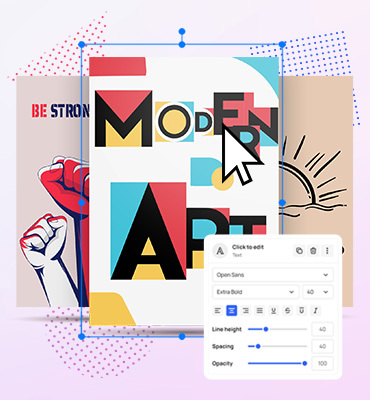Top 5 Placeit Alternatives to Consider in 2026

Screenshot from Placeit.net, October 2025
Looking for Placeit Alternatives with more flexibility, better workflows, or simply a different creative edge? Whether you design mockups for apparel, packaging, devices, or marketing visuals, the ideal tool should let you go from upload to polished export in minutes.
In this article, we compare five strong alternatives to Placeit. Each handpicked for real ecommerce / POD (Print on Demand) workflows. You’ll see what each tool excels at, where it stumbles, and who it’s for. We’ll also show how MediaModifier (our own platform) sits in that mix. No fluff, just actionable comparisons and use cases.
Here’s what to expect:
- A side-by-side look at the best alternative to Placeit tools in 2026
- Detailed feature, pricing, and licensing breakdowns
- Best picks by use case (printing apparel, digital device mockups, team collaboration)
- FAQ to settle lingering questions
Let’s get started.
Quick Summary: Best Alternatives to Placeit (TL;DR)
| Tool | Best For | Standout Strength | Pricing (starting) | Free / Trial Option | Why Choose It |
|---|---|---|---|---|---|
| MediaModifier | Fast product + mockup flow | Huge templates and mockups gallery, realistic e-commerce scenes & API integration | Starts ~$14/mo for MediaModifier Pro | Free plan with a limited number of mockups | Balanced core mockup tool for POD and marketplace listings |
| Canva (Mockup features) | All-in-one design + mockups | Massive design library & team tools | Starts ~$110/year for Canva Pro | Free plan with basic mockups | Ideal if you also do social posts, layouts, branding in same tool |
| Pixelied | Affordable design + mockup combo | A lot of mockups, drag-and-drop editor | Starts ~$47/year for Pixelied Pro | Free mockup generator option | Great for creators who need a budget mockup + design tool |
| Artboard Studio | Advanced scene building & animation | Layer control, scene editing, animation support | Starts ~$16 for Artboard Lite | Limited free tier | For users who want deep creative control over scenes |
| Mockuuups Studio | Desktop speed + device mockups | Desktop app, device scenes, plugin support | Starts ~$14/mo for Mockuuups Pro | Free plan with constraints | Perfect if you prefer a native app and large device mockup library |
How we picked these Placeit alternatives:
- Template realism & breadth: apparel, packaging, devices, lifestyle scenes that look shippable in a listing.
- Speed to first export: minimal clicks from upload to download; low learning curve.
- Ecommerce/POD readiness: sizes that fit marketplaces, background options, and repeatable workflows.
- Automation & scale: quick duplication, consistent sets, and batch-friendly steps where available.
- Brand control: clean placement, consistent lighting/perspective, and export quality.
- Licensing clarity: straightforward commercial use for listings and ads.
- Pricing transparency: simple tiers; value at solo and small-team levels.
- Product maturity: active libraries and stable editors.
The Best Placeit Alternatives in 2026 : MediaModifier, Canva, Pixelied, Artboard Studio & Mockuuups Studio
1) MediaModifier — Best for fast, realistic product mockups
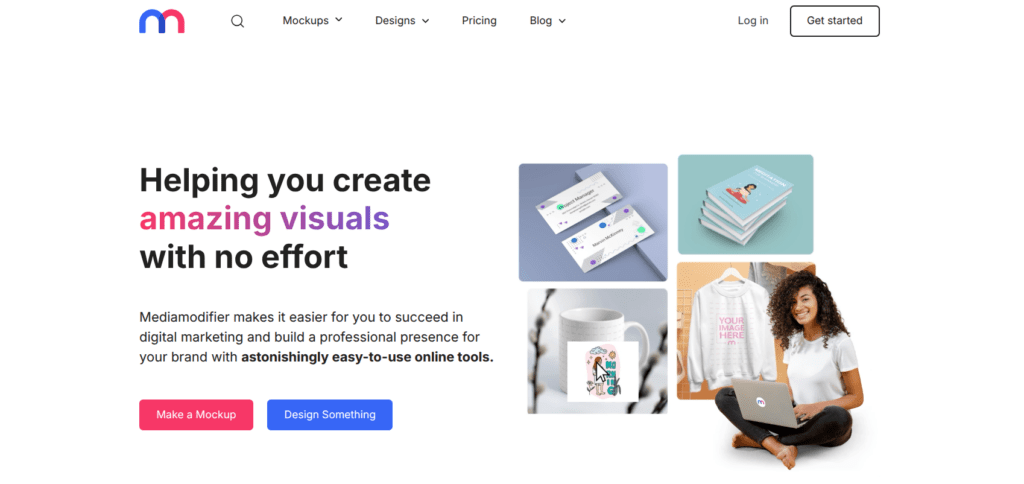
Snapshot:
MediaModifier helps creators and businesses build professional visuals in minutes through a browser-based mockup and design tool. It offers over 12,700 mockup templates across categories like apparel, packaging, print, tech, and social media.
Standout features:
- Huge template library with realistic scenes (t-shirts, mugs, posters, books, bottles, devices).
- Built-in Mockup API for automating bulk mockups.
- Integrated design editor for resizing, text, and graphic elements.
- Commercial license included for marketing and ecommerce use.
- Instant download in PNG or layered PSD.
Pricing:
Flexible subscription tiers with free previews; full export access starts via monthly or annual plans. Pricing starts at $14/month, with discounts on annual billing.
Perfect if you need:
- Quick, realistic visuals for Etsy, Shopify or other e-commerce listings.
- Consistent branding assets across marketing and product photos.
- Scalable automation for large catalog updates.
Pros:
✔ Realistic, high-quality templates
✔ Mockup API for automation
✔ Clear licensing for commercial use
✔ Fast, browser-based workflow
Cons:
✖ Limited offline use
✖ Some advanced design features only in editor mode
2) Canva (Smartmockups) — The all-in-one tool for design + mockups
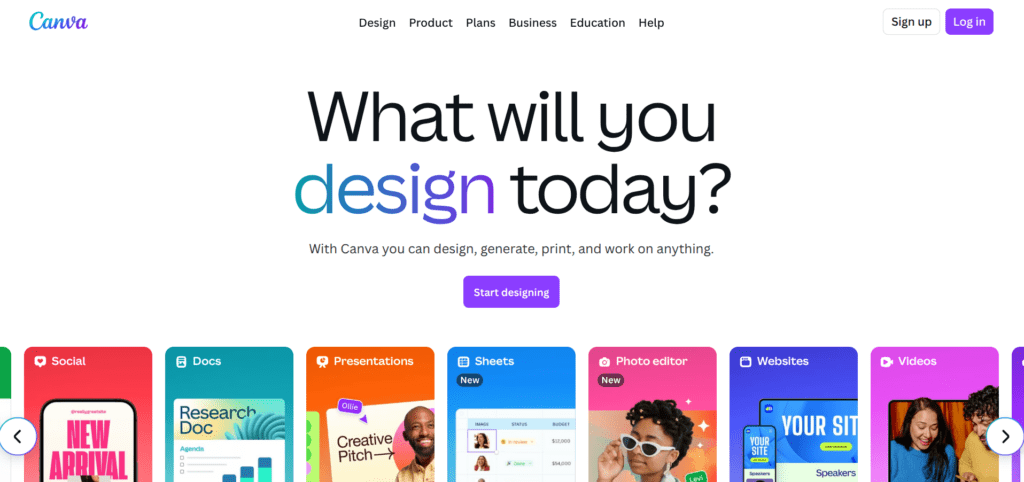
Screenshot from Canva.com, October 2025
Snapshot:
Canva is already a go-to platform for graphic design, marketing assets, and social media visuals. In recent years, Canva incorporated mockup capabilities directly into its product (via the Smartmockups tool) so you can turn your designs into real-world visuals without leaving the Canva ecosystem.
Standout features:
- Integrated mockup tool inside Canva: From your design, you can activate “Mockups” (formerly Smartmockups) to apply your art onto device screens, apparel, packaging, posters, and more.
- Library depth: Canva claims it offers over 2,000 mockup templates to free users and 8,000+ templates for Pro/Team users.
- AI-based mockup generator: Canva’s mockup tool is AI-powered.
- Team & brand control features: Brand kits, shared fonts/colors, team folders, version history—all valuable when your mockups are part of a broader content pipeline.
Pricing (latest):
Canva offers Free, Pro, Teams, and Enterprise tiers. The Free plan gives limited access (but still some mockup templates). Pro (~$13/month) unlocks full access to premium templates, AI tools, brand kit, and advanced mockup library. Teams Plans: more for collaboration, larger teams, asset management, and enterprise features.
Pros:
✔ Seamless design + mockup workflow — fewer tool hops
✔ Huge content library (templates, photos, graphics)
✔ Strong team and brand management features
✔ Great for content marketing + visual campaigns
Cons:
✖ Mockup tool may not be as specialized or deep as dedicated mockup platforms
✖ A lot of mockup templates are reserved for paid tiers
✖ Performance may lag for large catalogs
And if you want to consider alternatives to Canva, don’t miss our dedicated article.
3) Pixelied — Budget-friendly mockup + design combo

Screenshot from Pixelied.com, October 2025
Snapshot:
Pixelied is a lightweight browser-based design tool with built-in mockup capabilities, ideal for creators or small shops who want a unified workflow. Its mockup generator spans product scenes, print, packaging, and devices.
Standout features:
- Drag-and-drop mockup editor with flexible templates.
- Hundreds of mockup templates and ongoing additions.
- Customization controls: opacity, shadows, filters, layer editing.
- Print & packaging mockups included (boxes, posters, labels).
- Exports in multiple formats (PNG, JPG, etc.).
Pricing (latest):
Pixelied offers several plans, with free and paid tiers. The free plan includes basic templates, editing tools, limited storage, limited downloads. The Pro plan ($47/year) unlocks all Pro templates, extra features like custom fonts, unlimited branding presets, priority support.
Pros:
✔ Simple interface, fast to start
✔ Good mix of design + mockup in a single tool
✔ Regular template updates
✔ Works entirely in browser (no install)
Cons:
✖ Mockup depth and realism may lag behind tools specialized just for mockups
✖ Free tier is limited in exports / features
✖ No API currently (so less automation for bulk)
✖ Possible limitations on advanced control (perspective, lighting)
4) Artboard Studio — Best for advanced scene building & animations
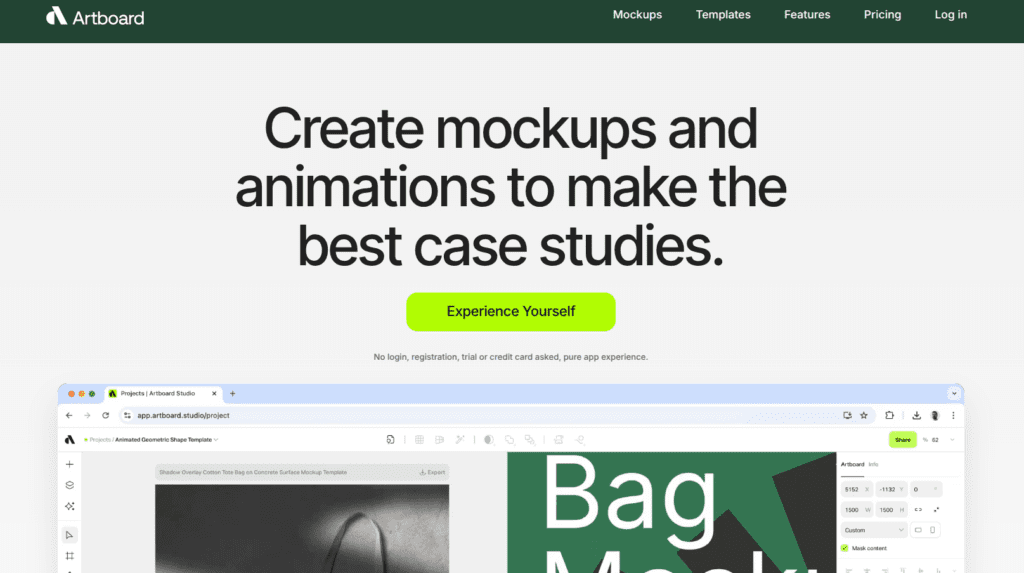
Screenshot from Artboard.studio, October 2025
Snapshot:
Artboard Studio is a browser-based creative tool combining mockups, motion design, and graphic editing. It provides a flexible “infinite canvas” for building scenes that go beyond simple mockups.
Standout features:
- Full composition control: layers, 3D objects, shadows, lighting, perspective tweaks.
- Animation & motion tools: timeline, keyframes, transitions built in.
- Infinite canvas: mix images, vectors, text, and animate within one workspace.
- Rich template & mockup library: access to items and scenes you can drop your designs into.
- Collaboration & sharing: project links, team folders (in higher tiers).
- Commercial license via paid plans (free tier is personal license only).
Pricing (latest):
- Free plan / Starter: allows a few projects, free mockup items, personal (non-commercial) usage.
- Lite plan: ~$16/month (billed annually) — unlocks premium mockups, commercial license, unlimited projects.
- Professional plan: ~$24/month — adds branding features, custom fonts, team tools, HD video export, versioning.
Pros:
✔ High creative control over scene composition and animation
✔ Ability to mix mockups with motion, visual storytelling
✔ Collaboration tools (in paid tiers)
✔ Strong template/mood library to accelerate scene building
Cons:
✖ Steeper learning curve than pure mockup tools
✖ Free version does not include commercial license — must upgrade for usage in listings or campaigns
✖ Some features (animation, team, asset management) locked behind higher tiers
✖ Browser performance can degrade in complex scenes
5) Mockuuups Studio — The desktop workflow for device & lifestyle mockups
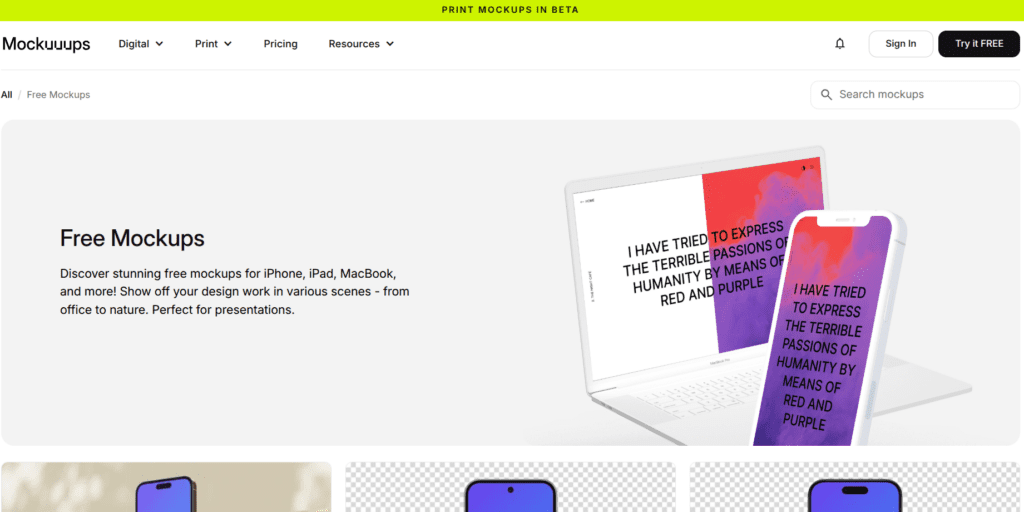
Screenshot from Mockuuups.studio, October 2025
Snapshot:
Mockuuups Studio is a native desktop app (macOS, Windows, Linux) designed for fast, drag-and-drop mockups—especially for devices and lifestyle scenes.
Standout features:
- Over 4,600+ device mockups available to plug visuals into instantly.
- Desktop app: local performance, faster interaction, no browser lag.
- Plugin integrations: Figma, Sketch, etc. Changes in original file propagate into mockups.
- Searchable gallery, favorites, quick previews across scenes.
- Commercial usage allowed (in paid plans).
Pricing (latest):
$14/month is standard paid subscription. Free plan: fully functional in preview, allows limited high-quality exports.
Pros:
✔ Very fast, native experience for mockups
✔ Huge selection of device and lifestyle scenes
✔ Updates via plugins maintain consistency when design sources change
✔ API option gives capacity for scale
Cons:
✖ Less emphasis on apparel, print, or packaging compared to full mockup platforms
✖ Free plan restricts number of high-quality exports
✖ Dependency on local app (less flexible than web tools)
✖ Some features (bulk modes, full library access) might require subscription
Placeit vs the Alternatives (Head-to-Head)
1) Placeit vs MediaModifier
Core difference: Placeit emphasizes volume — thousands of templates across countless categories — but its interface and mockup realism haven’t evolved much in recent years. MediaModifier, in contrast, focuses on quality, speed, and real-world usability.
| Feature | Placeit | MediaModifier |
|---|---|---|
| Template realism | Good, but often generic | Higher realism, better lighting & perspective |
| Editor | Basic upload only | Editable layers, resize, text & image tools |
| Mockup API | ❌ | ✅ Available for automation |
| Commercial rights | Included | Included |
| Export workflow | Slower (multi-page flow) | Faster (upload → preview → export) |
👉 Verdict: For sellers or marketers producing large sets of product images, MediaModifier’s workflow and API give it a real edge.
2) Placeit vs Canva (Smartmockups)
Core difference: Canva is a design suite first, mockup tool second. It’s perfect for all-in-one marketing tasks, but lacks some of the depth and automation that dedicated mockup generators provide.
| Feature | Placeit | Canva |
|---|---|---|
| Focus | Mockups only | Design + mockups + marketing assets |
| Collaboration | Basic | Excellent (brand kits, teams) |
| Customization | Limited | Strong design control |
| Library size | ~50k+ | ~8k mockups integrated |
| Automation | ❌ | ❌ (no bulk) |
👉 Verdict: Canva wins for versatility, but if mockups are your main output, tools like Placeit (or MediaModifier 😉) are still faster.
3) Placeit vs Pixelied
Core difference: Pixelied is more budget-friendly, offering mockups alongside a design editor. Its smaller library and limited automation make it better suited to small creators than professional sellers.
| Feature | Placeit | Pixelied |
|---|---|---|
| Templates | Massive (but inconsistent) | Smaller (curated, improving) |
| Price | $8/mo | $47/year (Pro) |
| Editor tools | Limited | Stronger customization |
| API | ❌ | ❌ |
| Ease of use | Simple | Very easy |
👉 Verdict: Pixelied is cheaper and cleaner, but not designed for bulk or advanced workflows.
4) Placeit vs Artboard Studio
Core difference: Artboard Studio targets creatives who want full control — advanced lighting, animations, and layered scenes. It’s not a “quick mockup” tool; it’s a scene-building environment.
| Feature | Placeit | Artboard Studio |
|---|---|---|
| Learning curve | Low | High |
| Creative control | Limited | Very high |
| Animation | ❌ | ✅ Built-in |
| Collaboration | Minimal | Available in Pro tiers |
| Licensing | Commercial | Depends on plan |
👉 Verdict: If you’re a motion designer or brand creative, Artboard Studio is unbeatable. For fast ecommerce visuals, Placeit (or MediaModifier) remains simpler.
5) Placeit vs Mockuuups Studio
Core difference: Mockuuups Studio offers a desktop workflow, prioritizing speed and device mockups (screens, apps, UI). It’s a niche tool, perfect for tech brands or UX designers.
| Feature | Placeit | Mockuuups Studio |
|---|---|---|
| Platform | Web only | Desktop app |
| Library | Large (broad) | Focused (device scenes) |
| Speed | Medium | Very fast |
| Automation | ❌ | ✅ via API |
| Integration | None | Figma, Sketch, etc. |
👉 Verdict: For app and UI visuals, Mockuuups Studio wins hands down. But for general product mockups, Placeit’s variety still helps — though MediaModifier bridges both worlds more elegantly online.
Overall takeaway
Each of these Placeit Alternatives fills a specific gap:
- MediaModifier → real-world ecommerce mockups + API automation.
- Canva → all-in-one design & collaboration.
- Pixelied → affordability & simplicity.
- Artboard Studio → advanced creative control.
- Mockuuups Studio → local speed & device mockups.
If you run a brand that produces listings weekly or monthly, MediaModifier’s combination of realism, browser speed, and automation tools simply saves more time.
Which Placeit Alternative Should You Choose?
If you’ve made it this far, you probably realize there’s no one-size-fits-all replacement for Placeit. The best alternative to Placeit depends entirely on how you work — your scale, your content pipeline, and how much creative control you actually need.
Here’s how to decide.
🛍️ For ecommerce & POD sellers: MediaModifier
If your workflow involves creating dozens (or hundreds) of product images for Etsy, Shopify, Redbubble, or Amazon, then speed and realism are everything.
MediaModifier’s mockup editor is built for that exact need: upload your product, choose your scene, and export — done. The lighting looks natural, the angles feel believable, and you can scale production with the Mockup API if you’re running multiple stores or SKUs.
Why it fits: You get a true “mockup engine,” not a design suite in disguise.
Bonus: Built-in commercial licensing means you can go straight from export to listing without hesitation.🎨 For all-in-one creative teams: Canva (Smartmockups)
If mockups are just one part of your broader visual workflow — and you also handle ads, reels, newsletters, and social media — Canva’s ecosystem makes sense. It’s ideal for marketing teams, agencies, or startups that want one dashboard to rule it all: design, collaborate, publish.
Why it fits: You can design a brand campaign, drop it into a mockup, and schedule social posts — all inside Canva.
Watch out for: Limited automation and mockup realism compared to MediaModifier or Placeit.💸 For creators on a budget: Pixelied
Pixelied sits in a sweet spot between free online editors and pro-grade mockup tools. It’s straightforward, affordable, and has a decent library for everyday use. It’s great for solopreneurs, freelancers, and sellers who only need mockups occasionally.
Why it fits: Clean interface, quick exports, low cost.
Watch out for: No automation, smaller template variety.🎥 For motion or brand creatives: Artboard Studio
If your deliverables include animated social videos, branded storyboards, or complex compositions, Artboard Studio gives you full control over every element — from shadows to movement.
Why it fits: Combines static mockups with motion capabilities in a single browser app.
Watch out for: More learning time; not optimized for quick, repeatable mockups.💻 For UX/UI & app visuals: Mockuuups Studio
When your main focus is showing interfaces (app screens, software dashboards, or web design previews) Mockuuups Studio is one of the most efficient choice. Its desktop app is lightning fast, integrates with Figma and Sketch, and the mockups feel premium.
Why it fits: Local speed + automation API + top-tier device realism.
Our recommendation:
Watch out for: Limited variety for non-digital products.
If your day-to-day involves selling or promoting physical products, MediaModifier will save you the most time — especially if you handle multiple listings or SKUs. Its mockup engine and API turn what used to be an hour of manual design into a one-click export.
Conclusion
In 2026, the landscape of mockup tools is broader than ever. But the real difference comes down to workflow. If you need mockups that look authentic, load fast, and fit seamlessly into your ecommerce or marketing process, MediaModifier remains a clear, balanced choice. It’s designed for creators who care about speed, realism, and consistency — from Etsy shop owners to brand managers.
Other tools shine in their own ways: Canva for teamwork, Pixelied for affordability, Artboard Studio for control, and Mockuuups Studio for native performance. But if you want to streamline your product visuals, MediaModifier is built to make that easy, day after day.
👉 Start designing today at MediaModifier.com
FAQ — About Placeit Alternatives
What are the best alternatives to Placeit in 2026?
The best Placeit Alternatives right now are MediaModifier, Canva (Smartmockups), Pixelied, Artboard Studio, and Mockuuups Studio.
Each one targets a different workflow. For example, MediaModifier for ecommerce and POD sellers, Canva for all-in-one design teams, and Mockuuups for fast device visuals.
What’s the best alternative to Placeit for product mockups?
If you mainly sell physical products (like apparel, packaging, or home decor), MediaModifier is the most practical alternative to Placeit.
It’s built for ecommerce workflows — realistic templates, ready-to-use product scenes, and a Mockup API for automation at scale.
Is there a free alternative to Placeit?
Yes, tools like Canva and Pixelied offer limited free access to mockup templates, while MediaModifier allows free previews before export.
However, for professional use (especially for ecommerce listings), paid plans are more reliable and include commercial rights.
Which Placeit alternative is best for ecommerce or POD (Print on Demand)?
For POD and ecommerce listings, MediaModifier leads the pack. It combines realistic product photos with commercial licenses and bulk automation.
Many sellers use it for Etsy, Shopify, and Amazon because it saves time without compromising visual quality.
Which Placeit alternative works best with teams or collaboration?
Canva wins here. Its team folders, brand kits, and shared templates make it the easiest option for marketing or design teams managing multiple campaigns together.
Do any Placeit alternatives support automation or bulk mockups?
Yes. MediaModifier’s Mockup API and Mockuuups Studio’s API both support automated mockup generation.
This is especially useful for large product catalogs or SaaS companies generating hundreds of product visuals dynamically.
Which Placeit alternative is best for device or digital mockups?
Mockuuups Studio specializes in device and lifestyle mockups — laptops, tablets, phones, and UI scenes.
It’s ideal for app designers and tech marketers who want to showcase product screens quickly.
What’s better for creative control — Placeit or its alternatives?
If you want simplicity, Placeit is fine.
If you need creative control (layering, lighting, animation), Artboard Studio goes much further. It’s closer to a full scene builder than a template generator.
Are all these Placeit alternatives browser-based?
Most are web-based (MediaModifier, Canva, Pixelied, Artboard Studio).
Mockuuups Studio is the exception — it’s a desktop app that runs locally, ideal for users who prefer offline speed.
Can I use mockups from these tools commercially (for my store or ads)?
Yes, but always check each platform’s licensing terms.
MediaModifier, Placeit, and Mockuuups Studio clearly include commercial rights in paid plans, while Artboard Studio restricts that to its Lite tier and above.
Are there any new alternatives to Placeit coming in 2026?
Several smaller tools like Dynamic Mockups or Vexels Mockup Generator are evolving, but they remain niche.
The five listed in this article represent the most stable and widely used options going into 2026.
Final verdict: which Placeit alternative is worth it?
If you need mockups that actually help you sell, choose MediaModifier — it’s focused on ecommerce practicality, mockup realism, and automation.
If you design social posts or full campaigns, go with Canva.
If you build creative animations, try Artboard Studio.
There’s no one-size-fits-all, but MediaModifier hits the sweet spot between speed, quality, and real-world usability.
Related articles
Visualize your design Use a product mockup to showcase your design
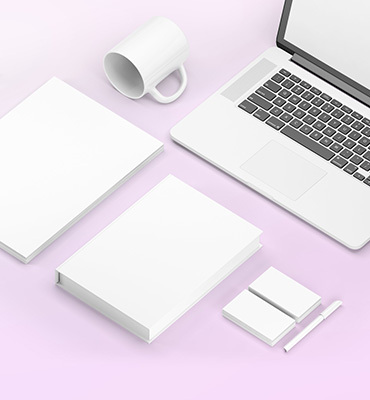

Create your design Use our templates to create delightful designs for any medium
